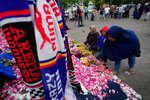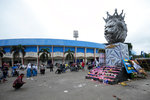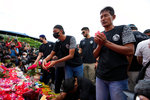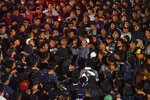



MALANG, Indonesia (AP) — Indonesian police said they were investigating over a dozen officers responsible for firing tear gas that set off a crush that killed 125 people at a soccer match, as families and friends grieved Monday for the victims that included 17 children.
Distraught family members were struggling to comprehend the sudden loss of loved ones at the match in East Java’s Malang city that was watched only by hometown Arema FC fans. The organizer had banned visiting Persebaya Surabaya's supporters due to Indonesia's history of violent soccer rivalries.
The crush was among the world's deadliest disasters at a sporting event.
Witnesses said fans flooded the pitch and demanded that Arema management explain why, after 23 years of undefeated home matches against Persebaya, Saturday night’s ended in a 3-2 defeat. Some of the 42,000 Arema fans threw bottles and other objects at players and soccer officials. At least five police vehicles were toppled and set ablaze outside the stadium.
But most of the deaths occurred when riot police, trying to stop the violence, fired tear gas, including toward the spectator stands, triggering the disastrous crush of fans making a panicked, chaotic run for the exits. Most of the 125 people who died were trampled upon or suffocated.
At least 17 children were among the dead and seven were being treated in hospitals, the Ministry of Women’s Empowerment and Child Protection said. Police said 323 people overall were injured in the crush, some of them still in critical condition.
National Police spokesperson Dedy Prasetyo said in a news conference that 18 officers responsible for firing tear gas, ranging from middle- to high-ranking, were being investigated along with “internal matters related to security management.”
He said police were still questioning witnesses and analyzing footage from 32 security cameras inside and outside the stadium and nine mobile phones owned by the victims as part of the investigation to also identify suspected vandals. Two police officers were among the dead.
Arema players and officials laid wreaths Monday in front of the stadium. “We came here as a team asking forgiveness from the families impacted by this tragedy, those who lost their loves ones or the ones still being treated in the hospital,” head coach Javier Roca said.
At the home of Faiqotul Hikmah, 22, her parents and relatives wailed when an ambulance arrived with her body wrapped in white cloth and a black blanket. An Aremania — the moniker for Arema fans — she died while fleeing to exit 12 at Kanjuruhan Stadium.
President Joko Widodo ordered the premier soccer league suspended until safety is reevaluated and security tightened. Indonesia’s soccer association has also banned Arema from hosting soccer matches for the rest of the season.
Arema FC President Gilang Widya Pramana expressed his sadness and deepest apologies to the victims and the Indonesian people, and said he is ready to take full responsibility for the tragedy at his team’s stadium.
He said that the management, coach and players were in shock and speechless.
“I am ready to provide assistance, even though it will not be able to return the victim’s life,” Pramana said in a news conference Monday at Arema’s headquarters in Malang.
“This incident was beyond prediction, beyond reason ... in a match watched only by our fans, not a single rival’s supporter,” he said, sobbing. “How can that match kill more than 100 people? An incident that probably wouldn’t exist in the world.”
He said that Arema FC was ready to accept any sanctions from Indonesia’s Soccer Association and the government, and “hopefully, it will be a very valuable lesson.”
Security Minister Mohammad Mahfud said he will lead a separate inquiry to investigate violations of law in the disaster. The team will also determine what victims' compensation should be provided and will complete the task in three weeks.
Despite Indonesia’s lack of international accolades in the sport, hooliganism is rife in the soccer-obsessed country where fanaticism often ends in violence. Data from Indonesia’s soccer watchdog, Save Our Soccer, showed 78 people have died in game-related incidents over the past 28 years.